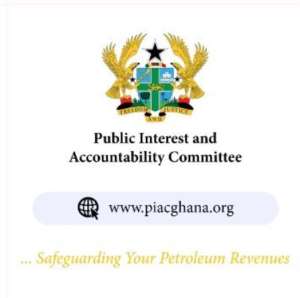
The Public Interest and Accountability Committee (PIAC) has published its Annual Report on the management and use of Ghana’s petroleum revenues for the year-end 2019.
Speaking during the launch of the Report, Noble Wadzah, Chairman of PIAC Ghana explained that the committee’s report is aimed at keeping Ghanaians and other interested stakeholders constantly informed as to how the country’s petroleum revenues are being managed, as well as serving as a tool for citizen’s feedback to be collated and shared with duty bearers including policymakers.
The 2019 Annual Report according to the Chairman comes with some key findings and recommendations from the committee. Some of the findings include the fact that the total Annual Budget Amount (ABFA) available for spending in 2019 was in the region of GHS 2.7 billion, out of which GHS 1.2 billion was utilized, leaving a balance of GHS 1.5 billion unutilized.
For the third consecutive year, not only has a sizable proportion of the ABFA not been fully utilized but it has also not been accounted for, impeding PIAC’s appreciation of the full scope of accounting to the public on the utilization of our petroleum revenues.
Also, the committee noted that in 2019, the Ghana National Petroleum Corporation (GNPC) supplied US$ 334.6 Million worth of raw gas to the Ghana National Gas Company (GNGC), but no payment was received, in respect of the supplies. This is largely on account of VRA’s inability to pay GNGC for the lean gas supplied. Added to the outstanding balance of US$ 333.5 Million, this brings the total indebtedness in respect of lean gas supplies to US$668.1 Million.
However, irrespective of the above indebtedness, GNPC continues to provide guarantees for a range of state-owned enterprises (SOEs), amounting to US$645.5 Million in 2019. This is about double, compared with the previous years’ and also outweighs the Corporations total equity financing expenditure of US $164. 79 Million for the period.
In the year under review, 45.14 percent of the actual ABFA was spent on recurrent expenditure, with 54.86 percent on capital expenditure. This was in violation of Section 8 (4a) of Act 893 which requires that a minimum of 70 percent be spent on public investment expenditure.
Ghana’s total oil production in 2019 according to PIAC increased by some 15 percent compared to 2018. Production in 2018 was 62.1 Million (62,135,435.07) barrels. The high recorded volume is on account of production on Jubilee and Sankofa Gye Nyame Fields.
There was also a greatest boost since the commercialization of natural gas in Ghana in 2019 with a total of 169,508.61 Million Standard Cubic Feet (MMSCF) of Associated Gas produced in 2019 that is an 85 percent over the 2018 volume of 91,459.30 MMSCF.
These increases earned the nation some US$925Million total petroleum receipts to the Petroleum Holding Fund in 2019 with receipts being distributed to the Ghana National Petroleum Corporation (GNPC), the Annual Budget Funding Amount (ABFA), the Ghana Stabilization Fund and the Ghana Heritage Fund.
PIAC lastly made some recommendations with regards to the 2019 findings. The committee urges parliament to bring its oversight mandate to bear on the Ministry of Finance’s impunity and failure in not accounting for utilized ABFA. For the third consecutive year, the actual ABFA, has not been fully utilized and accounted for, bringing the total unutilized and unaccounted ABFA to GHS 1.5 billion at the end of 2019.
The committee reiterates its earlier call to parliament to consider placing some restrictions on the proportion of GNPCs budget on CSI and guarantees to state institutions, particularly in the light of the Corporation’s inability to respond to some of its cash calls.
PIAC continues to call on the Government, as a matter of urgency, to address the unsustainable debt of Ghana National Gas Company. The committee also calls on the government of Ghana to expedite action on the infrastructure requirement for gas evacuation and utilization, in order to avoid a huge backlog of make-up gas volumes and the potential for resource waste.
Story by Malise Otoo




 We’ll no longer tolerate your empty, unwarranted attacks – TUC blasts Prof Adei
We’ll no longer tolerate your empty, unwarranted attacks – TUC blasts Prof Adei
 Bawumia donates GHc200,000 to support Madina fire victims
Bawumia donates GHc200,000 to support Madina fire victims
 IMF to disburse US$360million third tranche to Ghana without creditors MoU
IMF to disburse US$360million third tranche to Ghana without creditors MoU
 Truck owner share insights into train collision incident
Truck owner share insights into train collision incident
 Paramount chief of Bassare Traditional Area passes on
Paramount chief of Bassare Traditional Area passes on
 Two teachers in court over alleged illegal possession of BECE papers
Two teachers in court over alleged illegal possession of BECE papers
 Sunyani: Victim allegedly shot by traditional warriors appeals for justice
Sunyani: Victim allegedly shot by traditional warriors appeals for justice
 Mahama vows to scrap teacher licensure exams, review Free SHS policy
Mahama vows to scrap teacher licensure exams, review Free SHS policy
 Government will replace burnt Madina shops with a new three-story, 120-store fac...
Government will replace burnt Madina shops with a new three-story, 120-store fac...
